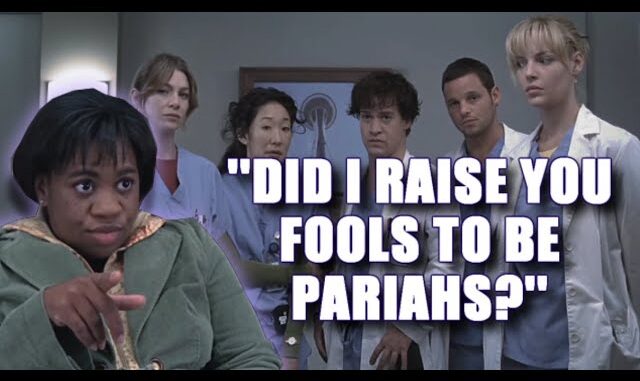
The Scalpel and the Scowl: Bailey's Reign of Terror on the Interns
Miranda Bailey, the formidable Chief of Surgery at Grey Sloan Memorial, was a force of nature. She was a whirlwind of medical brilliance, sardonic wit, and unyielding discipline. But lately, a new element had been added to her repertoire: a palpable, almost gleeful, animosity towards the incoming class of interns. It wasn't just the usual drill sergeant routine she employed to forge capable doctors from wide-eyed rookies; it was a deliberate, almost theatrical, display of disdain that left the interns trembling in her wake. Bailey hated her interns, and she wasn't hiding it.
The evidence was mounting daily. Where once she had offered constructive criticism, now she delivered scathing pronouncements laced with a vinegar tang. When an intern, trembling and green around the gills, fumbled a basic suture, Bailey didn't just correct the mistake; she launched into a detailed, colorfully worded lecture on the history and proper application of sutures, culminating in a dismissive, "Honestly, do they even teach you anything in medical school these days?" The intern shrunk, a wilted flower under Bailey's blistering gaze.
Her methods bordered on the absurd. She assigned them the most demeaning tasks imaginable. Scrubbing toilets with surgical precision became a badge of honor among the group, a shared misery that forged a fragile bond. One unfortunate intern, Sarah, was tasked with cataloging every surgical instrument in the hospital, a Sisyphean endeavor that left her perpetually exhausted and covered in a fine layer of dust. Bailey, when asked about the seemingly pointless exercise, merely shrugged and stated, "Attention to detail is crucial, intern. And besides, someone has to do it."
The interns whispered amongst themselves, theorizing wildly about the source of Bailey's wrath. Had they personally offended her? Was it a cosmic injustice, a collective penance for sins they hadn't committed? Some suggested it was a strategic ploy, a twisted form of selection process designed to weed out the weak. Others, more cynical, believed she was simply channeling her own frustrations with the endless bureaucracy and political maneuvering that came with her position.
But perhaps the truth was more complex. One afternoon, while observing a complicated surgical procedure, an intern, Mark, dared to ask Bailey a question about her technique. Instead of the usual withering response, Bailey paused, her expression softening slightly. She patiently explained the intricacies of the procedure, her passion for medicine momentarily eclipsing her animosity.
In that fleeting moment, Mark saw a flicker of something else beneath the surface: fear. Fear that these bright-eyed interns, with their idealistic notions and unburdened optimism, would inevitably be broken by the realities of the medical world. Fear that they would lose their passion, their empathy, their humanity in the face of death and suffering. Perhaps her relentless criticism was a twisted form of inoculation, a brutal attempt to harden them against the emotional toll of the job.
It didn't excuse her behavior, of course. Her methods were harsh, often unnecessarily cruel. But understanding the potential source of her animosity offered a different perspective. Bailey's reign of terror wasn't just about power or control. It was a desperate, misguided attempt to prepare these young doctors for the battlefield that lay ahead, a battlefield where lives hung in the balance and the stakes were impossibly high.
Whether her methods were effective remained to be seen. The interns were certainly terrified, but they were also learning, growing, and slowly developing the thick skin required to survive in the demanding world of surgery. In the end, Bailey's legacy as Chief of Surgery wouldn't just be about her groundbreaking surgeries or her innovative leadership. It would also be about the interns she molded, the doctors she shaped, and the complex, often brutal, path she carved for them through the chaos and heartbreak of Grey Sloan Memorial. Her hatred, however thinly veiled, was a strange, twisted testament to her belief in their potential, a belief she desperately hoped they would live up to.